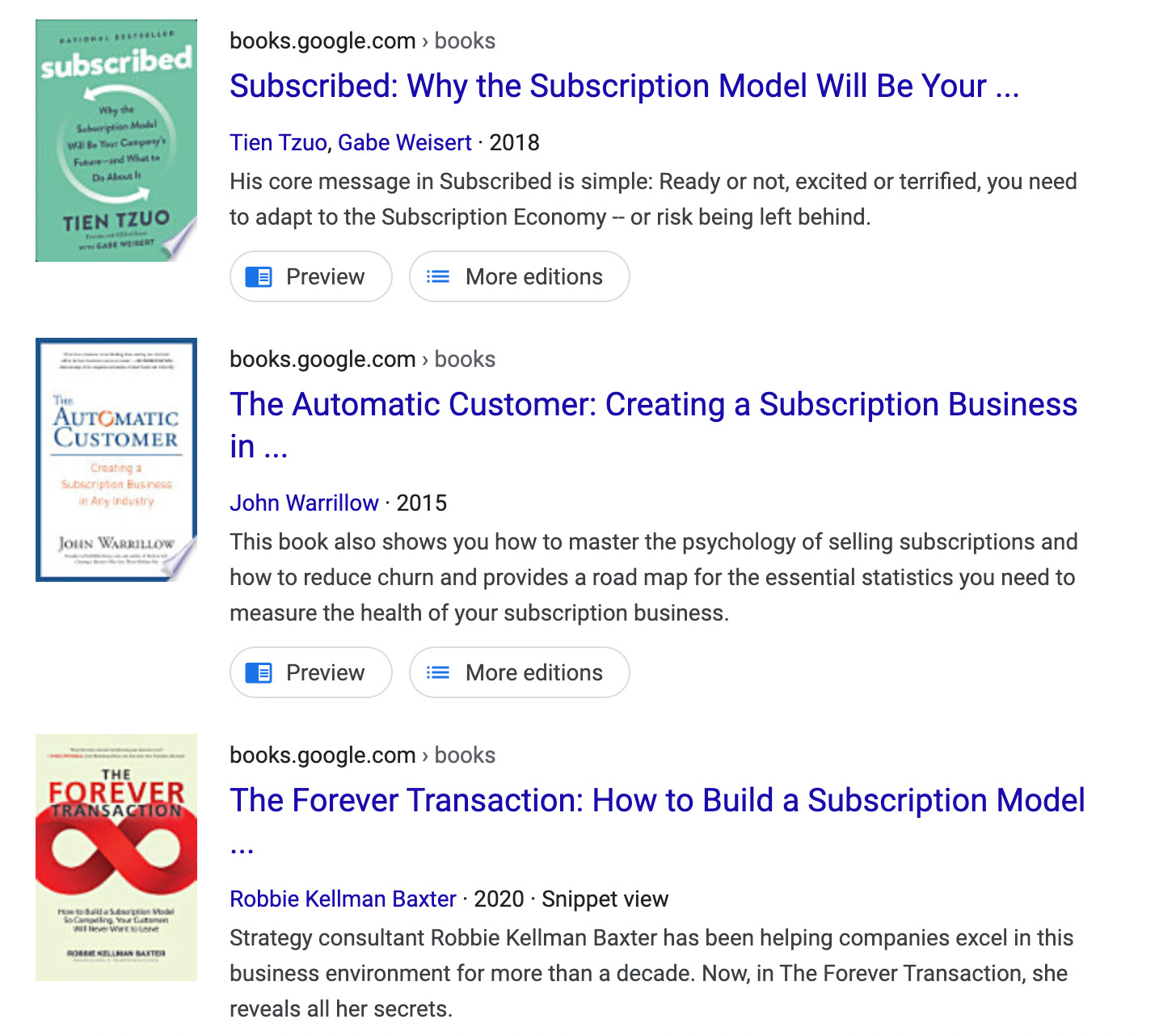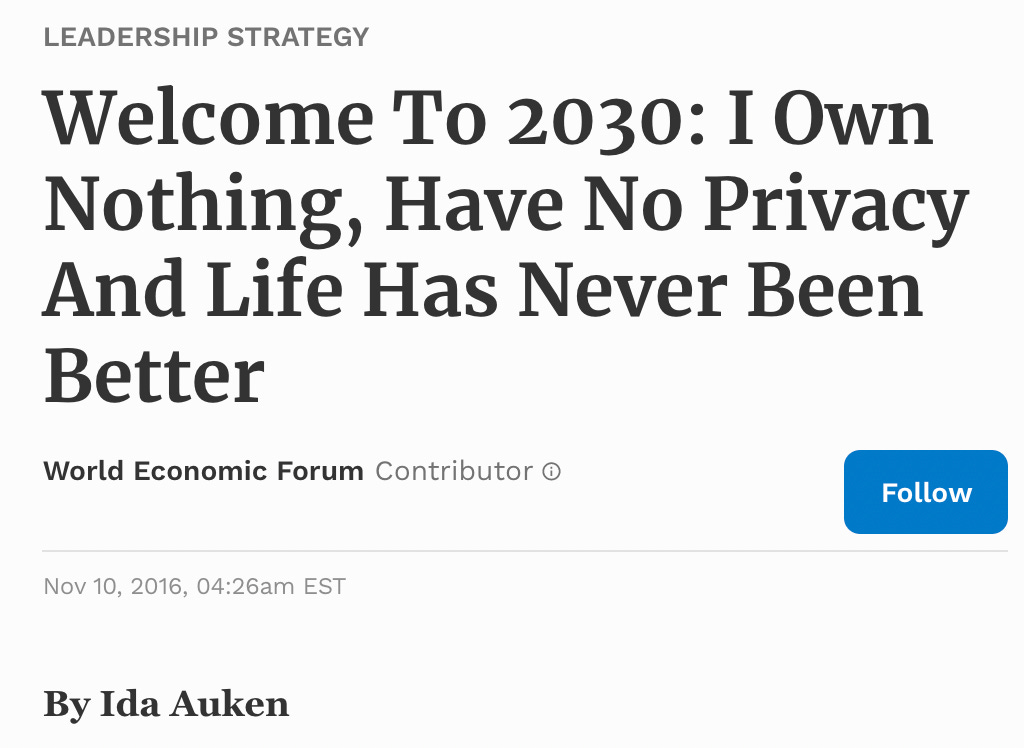Twenty-two years ago, the economist and social critic Jeremy Rifkin warned about the emerging commodification of human experience. Markets have always exchanged private property, he wrote, and people have grown accustomed to the act of holding it personally – that is, of owning things. But in a new “hypercapitalist” world, he warned, ownership would be concentrated in a few corporate hands, and most people would pay to access property, “in the form of short-term leases, rentals, memberships, and other service arrangements,” rather than owning it. Remember that description about leasing all of your stuff in a series of service arrangements, because you’ll be seeing it again in a minute or two.
The man was not wrong about the degree to which businesses would aspire to turn one-time sales of stuff into endless monthly purchases of a service:
And then comes the politics:
The shift from a propertied regime based on the idea of broadly distributed ownership to an access regime based on securing short-term limited use of assets controlled by networks of suppliers changes fundamentally our notions of how economic power is to be exercised in the years ahead. Because our political institutions and laws are steeped in market-based property relations, the shift from ownership to access also portends profound changes in the way we will govern ourselves in the new century.
And this, and look closely for the most important sentences — two of them, short and adjacent:
In a society where virtually everything is accessed, however, what happens to the personal pride, obligation, and commitment that go with ownership? And what of self-sufficiency? Being propertied goes hand in hand with being independent. Property is the means by which we gain a sense of personal autonomy in the world. When we access the means of our existence, we become far more reliant on others. While we become more connected and interdependent, do we risk at the same time becoming less self-sufficient and more vulnerable?
The shift in the structuring of human relationships from ownership to access appears to invite a trade-off of sorts whose outcome is far from certain. Will we liberate ourselves from our possessions, only to lose a sense of obligation to the things we fashion and use? Will we become more embedded in networks of relationships, only to become more dependent on powerful networks of corporate suppliers?
Property is autonomy. That was a warning about your own life: less autonomous, more dependent. And it was, specifically, a warning about corporate capitalism on the subscription model1, and the social and political effects of a concentration of property in increasingly few hands. Hypercapitalism would be the new feudalism, a system of lords and serfs.
Now, watch this piece of magic.
I became aware today of the existence of the Danish politician Ida Auken, thanks to this post from a very bad cat. This is real:


Ida Auken is a (robotic) social democrat — a progressive. She’s not kidding, and she keeps saying this. Here she is in Forbes, making a pitch for progress:
Reader, click on that link. Look at all the human empowerment in this piece:
In our city we don't pay any rent, because someone else is using our free space whenever we do not need it. My living room is used for business meetings when I am not there.
Once in a while, I will choose to cook for myself. It is easy - the necessary kitchen equipment is delivered at my door within minutes. Since transport became free, we stopped having all those things stuffed into our home. Why keep a pasta-maker and a crepe cooker crammed into our cupboards? We can just order them when we need them.
I am liberated. My apartment has been dekulaked by corporate collectivism. I want to fry an egg; I will order a rental pan from the service. This person means this. She is authentically trying to sell this to you as a vision of a better future.
The point of all this, you’ll be shocked to hear, is that the concentration of property in increasingly few hands, and the transition to a system of shared property for use under a system of feudal rents, makes the climate stop changing. Also, airplanes will switch to biofuels, and lunch is plants. “At home,” she writes, “all of your household appliances have been turned into service contracts.”2
Rifkin’s warning is Auken’s prescription. The alarm from two decades ago about the perils of greedy hypercapitalism and the overconcentration of private property in a shrinking number of corporate vessels has become the bleeding edge of…progressive politics? A warning about corporate greed and the decline of personal autonomy has become leftist prescription. Everything you use will be owned by corporations, and you will have subscription contracts for the elements of your daily existence, a social democrat says, congratulating you on your progress.
The opponent of the overconcentration of power Jeremy Rifkin, by the way, went on to become an advisor to Jean-Claude Juncker, and to help shape Angel Merkel’s energy policy, and to the choice of “advising the leadership of the Peoples Republic of China on the build out and scale up of the Internet Plus Third Industrial Revolution infrastructure to usher in a sustainable low-carbon economy.”
The world is a very strange place. You may already have noticed this.
Insert own Substack joke.
I’m sorry, Chris Bray, your social credit score does not allow for the operation of a coffeemaker this morning. Please review your unacceptable social media history, and try again after becoming more acceptable.



Sounds like a prison regime. No one owns that chipped plate & bent fork, so nobody takes any care of it.
How about a foot file. Is that leased? What is owned? Underwear? Anything?
I’m perfectly willing to use and own fewer things. That’s my preference rather than to borrow everything.
I have (or rather, had) a hobby of fixing things, from old machinery to decorating houses. In 1980, virtually no one hired a decorator. You did the best job you could or you left it as it was. We had many “ DIY stores”. Some people owned an increasing set of tools they knew how to use & maintain. I was one of those people.
They dearly want this sort of neo-feudal subscription model for everything (as you note, the irony of critiquing this model on Substack is obvious). Networked robotics certainly makes it technically feasible.
I wonder, though. At the same time, there are other, countervailing trends that will probably work against this. 3D printing, for example, will ultimately make it possible for individual households to manufacture a wide array of items from basic feedstocks. Insofar as the raw materials can be acquired locally or even simply recycled, that provides an impressive level of independence from extended supply chains.
Smart contracts, cryptocurrencies, and other blockchain technologies can make transactions possible without the need of a centralized authority.
Solar power generation can make houses relatively energy independent, or at the very least less dependent on the grid.
Home gardens, particularly advanced ecologies such as permaculture and aquaculture, can generate a high number of calories from relatively small real estate footprints.
I could easily see two parallel societies emerging over the coming decades. One a hyper-controlled, surveilled, urban environment where everyone lives in pods, eats bugs, minds their social credit scores, owns nothing, and pretends to be happy about it (lest that reflect poorly on their social credit scores).
The other an ungovernable hinterland of armed rural communities that produce everything they need for themselves, confederate together in loose, nimble networks for mutual trade and defense, and pay absolutely no attention to the regulations of the urban technocrats.
I don't kid myself that the technocrats will be particularly happy about that situation. My assumption is that developments in military technology (especially the force-multiplying offensive capabilities of drone warfare) will prove to be an effective barrier to hard power even as 3D printing, blockchain, etc., serve as a bulwark against globalist soft power.